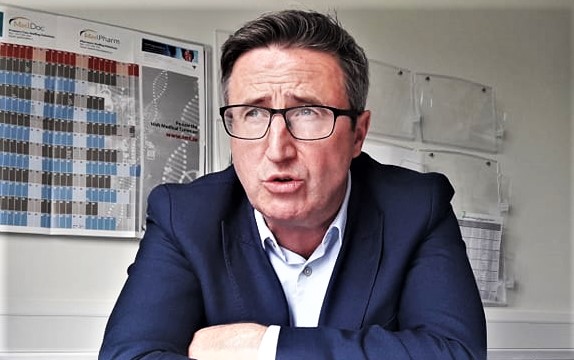
THE Clinical Director of Cancer Services for the UL Hospitals Group has said the cyber attack on the HSE’s computer systems has had a “devastating” impact on his department’s ability to treat and manage patients, particularly those awaiting investigative procedures.
The UL Group has urged the public not to attend previously arranged outpatients appointments at any of its six hospital locations in the midwest, unless patients are specifically contacted by the group with an appointment time — This will be done by telephone, a spokesman said.
Dr Denis O’Keeffe, a Consultant Haematologist and head of cancer care at University Hospital Limerick gave a grim insight into the battle he and his team are fighting in the hospital system trenches as a result of the cybercriminals attack: “Certainly the amount of information that we have on patients is much less than what we used to have. That does increase the risk for patients, there is no denying that.”
“We are printing off (paper) reports etc, but that’s not the same as having the extensive (electronic) background that we are used to having.”
While outpatients already undergoing treatment for radiotherapy and chemotherapy have been largely “unscathed” by the cyberattack, O’Keeffe is seriously concerned for people waiting on results of biopsies and scans or who are waiting on appointments for investigative procedures.
“They in truth would be where my greatest worry would lie because many people and things have been delayed and there has been an increase in waiting lists for people with problems which will ultimately turn out to be cancer.”
“You can imagine as a clinician to have somebody presenting to you, who is unwell, and right there in that moment you don’t have their notes, you don’t have an electronic record to identify what they’re diagnosis is etc, so it is pretty close to as a bad a nightmare you can have.”
Staff were already “exhausted” from the impact of COVID-19, however when cyber criminals launched the grenade which ultimately took out hospital IT systems O’Keeffe says his first thought was, “I just don’t believe it, and then you’re next thought is all we need now is a swarm of locusts to come at the end of the month and we will have the full calamity here”.
The silencing of computers has caused a multitude of problems. O’Keeffe and his troops must now relook “at how the chemotherapy is written up safely, and review whether there are any risks that we are missing or that have turned up from the day before”.
And, the hits keep on coming, he says: “There will be a small number of patients that we were unaware were meant to be coming in, who turn up, and then we have to manage them — can we get their notes, can we ensure that we have enough evidence to ensure their treatment is safe in terms of their background.”
The search for handwritten or printed out notes can exacerbate delays causing “a devastating impact on both the speed at which we can assess patients”
O’Keeffe says he is also concerned that “there is a small risk for a small number of patients that, yes, they could fall through the cracks” due to the infection which has laid up HSE computers.
He also acknowledges a paper-led system over a computer system does pose an additional risk to patient safety: “The risk is certainly increased that a mistake can happen, because as you can imagine the reason we don’t use paper anymore is because it is not as risk-averse, or, it has a greater risk in comparison to IT systems being in place.”
O’Keeffe says all members of staff are trying to work while trying to manage unprecedented levels of stress.
Prior to the cyber attack his job already involved “difficult, stressful, tiring” challenges “dealing with some very difficult situations, giving people difficult diagnosis, bad news etc,”…However, now “you have an added extra layer of, ‘where is my go-to information to be able to fully inform this patient what is happening.”
Meanwhile, the fallout from Covid-19 continues, resulting in delayed cancer diagnosis due to some patients having not attended their GP or hospital for fear of contracting or spreading the virus.
“There is no doubt that we’ve seen patients presenting at later stages of their disease when they are being diagnosed than we would have before the pandemic.”
O’Keeffe has a clear message for the government: “I think the number one lesson out of all of this is IT systems, the fact that we were so vulnerable, the fact that even before this happened our IT set up in Health was years behind other places where I worked before in the UK and in New Zealand, so I hope this is a wake-up call.”
The ongoing battle to treat, diagnose, and maintain patent safety with one hand tied behind his back is “very exhausting”.
However, despite it all, he remains upbeat: “We are still up and running, we have paper-based systems, which is difficult, but you will be managed safely despite all of the challenges.”










